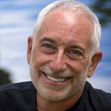Acts of Surrender 22: Catching Up With Myself

"Know first, child, that you needn't understand everything, that mystery is among life's greatest gifts."
~ Eulisha, in The MoonQuest: A True Fantasy
1.
For over a year now, I've been a regular featured guest on Rev. Carla McClellan's Spiritual Coaching radio show on Unity.fm. It began as a one-off slot after another Unity host, Jamie Sanders, recommended me to Carla. But she and I got on so well and our conversation was so lively, natural and inspired, that I've returned pretty much every month since.
Yet as much fun as each encounter with Carla has been, today's blew the fun-meter off the chart. And while I know it inspired listeners, it delivered a particularly powerful punch for me, too. The topic this afternoon was fear, and we spent a lot of time talking about The MoonQuest, where fear is a key theme -- both in its story and in my experience of writing it.
Toward the end of the hour, I found myself sharing several stories around my time in Nova Scotia, where, in 1994-95, I wrote most of the novel's first two drafts.
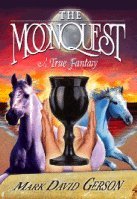 I've written before about The MoonQuest's genesis and about how it leapt to life during a Toronto writing workshop I was teaching. The morning after that March 1994 workshop, I continued writing on the story (a story I knew nothing about, except as it emerged onto the page) until June of that year, when I made an exploratory visit to Nova Scotia.
I've written before about The MoonQuest's genesis and about how it leapt to life during a Toronto writing workshop I was teaching. The morning after that March 1994 workshop, I continued writing on the story (a story I knew nothing about, except as it emerged onto the page) until June of that year, when I made an exploratory visit to Nova Scotia.It would be five months before I would return to work on that first MoonQuest draft.
The Toronto workshop took place in a living room still strewn with unpacked boxes. I had just moved from the one-bedroom downtown apartment that had been my home for eleven years to a spacious flat near High Park, one of Toronto's biggest open spaces.
When I moved to High Park, it was with the dream that this would be a transitional move that would ultimately take me out of the city and into the rolling Caledon highlands northwest of Toronto. My goal: country living in five years.
I was sharing this goal with my friend Tammy one April morning. Tammy had followed me from Montreal to Toronto and lived nearby. We didn't see each other often, but we spoke on the phone regularly -- not about anything profound. Until this day.
"You're going to think this is crazy," she began in her characteristically self-diminishing way, "but I can actually see you living in the country. East of here, somewhere. Near the water. It could be on Lake Ontario. But it seems more like Maine. Or Nova Scotia."
Tammy would never have described herself as psychic or intuitive, and I'm not sure she believed what was coming out of her mouth. But for the next twenty minutes, she painted a detailed picture of how she saw my life unfolding. It was stunning in its detail. What was more stunning still was how accurate it all seemed. Not in its precision but in its feeling.
"Okay," I thought. "Five years from now. Why not?"
Thirty minutes later I was on my bicycle, heading west along Annette Street toward the winding Humber River bike trail.
"Yarmouth," a voice whistled to me on the breeze. "Yarmouth," it repeated through my afternoon ride along the river trail.
 I knew Yarmouth was in Nova Scotia. But that's all I knew. When I got home in those pre-Google days, I pulled out my atlas and found it: the largest town in southwest Nova Scotia, right across the Bay of Fundy from Maine.
I knew Yarmouth was in Nova Scotia. But that's all I knew. When I got home in those pre-Google days, I pulled out my atlas and found it: the largest town in southwest Nova Scotia, right across the Bay of Fundy from Maine."Yarmouth is as good a country-place-by-the water as any," I thought, shutting my Rand-McNally. "Anyhow, it's five years away."
Or so I thought...
As the weeks passed and I surrendered more and more fully to the idea of moving to Nova Scotia, I could feel that timeline collapsing in on itself. Five years became three years and then two. There was nothing logical about this. Hell, there was nothing logical about anything in my life anymore. It was more an intuitive feeling-sense, one that would often come over when I went for my daily walks in High Park.
On the day an eighteen-month target shrank to twelve, I collapsed onto the nearest rock, pulled my journal from my backpack and scribbled furiously. What would it be like to leave Toronto? What would it be like to move somewhere I'd never been?
My life to that point had been so controlled. The riskiest thing I had ever done was move to Toronto, and that hadn't been much of a risk at all: I knew the city well and had friends there. And my gig as Canadian stringer for The Chronicle of Higher Education newspaper guaranteed me a basic income.
But Nova Scotia? In a year?
The first thing to do, I determined, was to get out there for a visit. (I hadn't reached the trust point I would reach a few years later: one that would let me move to Hawaii sight unseen.)
2.
If I expected a trip littered with Old Testament-style miracles that confirmed my inner sensings, I wasn't disappointed. After all, miracles are ever-present when we open our eyes to see them.
 The first occurred just after I got to Halifax. Down the street from my B&B, a cramped second-run theater was showing Kenneth Branagh's Henry V
The first occurred just after I got to Halifax. Down the street from my B&B, a cramped second-run theater was showing Kenneth Branagh's Henry V , which I'd somehow managed to miss when it had first hit the screen five years earlier.
, which I'd somehow managed to miss when it had first hit the screen five years earlier.To this day, the battle scene where, against overwhelming odds, Henry and his ragtag army defeat the French on St. Crispin's Day moves me deeply — often to tears. It's a reminder that, with faith, nothing is impossible.
When I left the theater that cool Halifax night, I was even more certain about my Nova Scotia move. But just in case I might waver, I returned to see the movie again the following night.
I still didn't know what I would explore through my scheduled two week of Maritime travel. But after two viewings of Henry V, I felt sure that, like Henry's army, I could walk away from the battlefield of my own fears singing Non nobis domine, and all would be well.
My two weeks in Nova Scotia were filled with magic — the magic of freedom that came with my first-ever road trip, the numinous magic of land- and seascape, the magic of Dorothy Gilman's Nova Scotia memoir, A New Kind of Country, which led me to the collection of villages (Pubnico, West Pubnico, East Pubnico, Middle East Pubnico and Lower East Pubnico) that I knew would be my Nova Scotia home, and the magic of synchronicity, which turned up most eloquently in the parking lot of a West Pubnico pharmacy one Sunday afternoon.
Jung described synchronicity, a term he coined, as "meaningful coincidence," and that late July experience certainly fit that description.
Earlier that afternoon, I had returned to Chez Marie, my West Pubnico B&B, with feet so sunburned from a leisurely beach walk at Cape Sable that I could barely stand wearing shoes.
 In all the Pubnicos (five), there was only one pharmacy. And on Sundays the Pharmasave was open for only a single hour, from six to seven. At 5:45 p.m., I pulled into the parking lot in my burgundy Chevy Corsica, tuned, as always, to the radio service of the Canadian Broadcasting Corporation. On the air was Cross Country Checkup, the network's call-in show. The topic: "giving it all up to follow your dream." The featured guest in that moment? The editor of The Yarmouth County Vanguard, who had recently quit her corporate job in Montreal to return to her Acadian roots in southwest Nova Scotia.
In all the Pubnicos (five), there was only one pharmacy. And on Sundays the Pharmasave was open for only a single hour, from six to seven. At 5:45 p.m., I pulled into the parking lot in my burgundy Chevy Corsica, tuned, as always, to the radio service of the Canadian Broadcasting Corporation. On the air was Cross Country Checkup, the network's call-in show. The topic: "giving it all up to follow your dream." The featured guest in that moment? The editor of The Yarmouth County Vanguard, who had recently quit her corporate job in Montreal to return to her Acadian roots in southwest Nova Scotia.I was so riveted by Anne's story that I nearly missed the West Pubnico pharmacy's narrow opening-window. The next day, I drove to the Vanguard's Yarmouth office, introduced myself and shared my story. Anne's office would be my first shaky stop, ten weeks later, when, on my fortieth birthday, I passed through Yarmouth on my way to my new Pubnico home.
When I got back to Toronto a few days later, I was still aiming for a spring move. After all, I was scheduled to start teaching a ten-week writing class at the University of Toronto the following month.
My Muse had other plans: While the two other sections of the ever-popular class were filling up nicely, no one had signed up for mine. I was stunned. "If the class isn't a go," I told myself, "I'll look at leaving Toronto in the fall." A day later, I recanted. I realized that I'd spent all my life letting external circumstances rule my choices. I knew I had to do it differently this time.
"What," I asked myself, "is keeping me in Toronto?" Was it just the class? Or was there another reason to stay until spring? When I realized that nothing other than the class was keeping me in Toronto, I cancelled it and began to plan my exodus.
 While I'd never been a packrat, I'd also never felt any need to pare down my belongings. Well, that's not entirely true. I was a bookaholic, and had moved to High Park with forty boxes of books. The books would have to go, along with furniture, kitchen contents and just about everything else. If it didn't fit in my new 1994 sea-blue Dodge Caravan, it wouldn't be coming. And nothing, apart from a few boxes of tax records and old journals, would stay behind.
While I'd never been a packrat, I'd also never felt any need to pare down my belongings. Well, that's not entirely true. I was a bookaholic, and had moved to High Park with forty boxes of books. The books would have to go, along with furniture, kitchen contents and just about everything else. If it didn't fit in my new 1994 sea-blue Dodge Caravan, it wouldn't be coming. And nothing, apart from a few boxes of tax records and old journals, would stay behind.A lifetime of letting go was about to begin.
In this pre-Internet, pre-Craig's List era, I had no garage sale. I simply started telling friends, colleagues, neighbors and students that I was selling everything. And, with a little help from an army of used-book dealers, everything moved so quickly that I advanced my departure date by a month. Instead of leaving at the end of October, I planned to leave on September 30. Three nights on the road would land me in Nova Scotia on the morning of my fortieth birthday.
And what a morning it was.
After weeks of nonstop, panic-free activity — shedding my possessions and shutting down life as I knew it — I woke up in my New Brunswick B&B to a queasy stomach.
Anne Fawcett, whose Comforts of Home B&B guide had been my Nova Scotia travel bible and who was now hosting me in her own B&B on my final night's journey, had prepared a generous hot birthday breakfast for this chilly Maritime morning.
I couldn't eat it. Instead, I shoved my overnight things back into my overstuffed Caravan and hit the road. I barely noticed the fiery fall colors along one of New Brunswick's most scenic river drives. I wasn't stressed. I was numb.
That numbness continued through my three-hour sailing across the Bay of Fundy, punctuated with mild feelings of nausea. I wasn't seasick. I was scared. I sat in the cabin and stared unthinkingly at the ocean, unwilling to give my fearful mind any space. But my fearful mind had other ideas. Within moments of driving off the ferry at Digby, Nova Scotia, I pulled into a Shore Road picnic area, windows rolled up to keep anyone from hearing my soul-shaking sobs.
What have I done? I've moved nearly 1,000 miles from home to a place where I know no one. What will I do here? What will I be here? Who will I be here? WHY am I here?
The question repeated with staccato urgency through the sobs that quaked through me. Fifteen minutes later, depleted by my tears and with no new answers, I started the car, turned onto NS-101 toward Yarmouth and the Pubnicos.
Whatever it meant, I was home.
3.
A few days later, a tiny event notice in The Vanguard caught my attention: Nova Nada, a monastic community of Carmelite hermits in the Nova Scotia interior, was having an open house. I turned the page, but some inner imperative kept urging me back. North Kemptville, the nearest town was, itself over an hour away on back roads. But Nova Nada, in keeping with its hermetic purpose, was farther inland still, in a converted hunting lodge accessed through miles of single-lane, boulder-strewn dirt road.
The following Sunday morning, I car-trekked out to the cluster of wooden cabins that comprised the hermitage and discovered a warm, welcoming community of deeply spiritual monks — both male and female. After Mass, I caught up with Father Tom and told him of the journey that had brought me to Nova Scotia.
"You should come out here for a retreat," he said.
"A retreat?" I retorted silently. "I'm living a retreat!"
It wasn't too many weeks later, though, that I realized he was right. I called and booked the first availability: the final week of November.
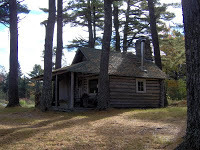 As a community of hermits, the Nova Nada monks spent most of their week in personal retreat. They prepared and ate most meals alone, in their individual cabins, sharing only two meals each week in community — a rule that was expanded to three during my stay to accommodate U.S. Thanksgiving. Most of the community members were American and had come to Nova Nada from Nada, the original hermitage in Crestone, Colorado. In addition, one full day was spent in silence, with verbal interaction restricted to emergencies.
As a community of hermits, the Nova Nada monks spent most of their week in personal retreat. They prepared and ate most meals alone, in their individual cabins, sharing only two meals each week in community — a rule that was expanded to three during my stay to accommodate U.S. Thanksgiving. Most of the community members were American and had come to Nova Nada from Nada, the original hermitage in Crestone, Colorado. In addition, one full day was spent in silence, with verbal interaction restricted to emergencies.It was a deepening of my retreat, a week spent in meditation, more journaling, long walks in the chill of approaching winter, communion in Nova Nada's eclectic library with May Sarton, Henri Nouwen, Madeleine L'Engle and J.R.R. Tolkien, and daily mass in the rustic chapel.
I'd already experienced the chapel during Open Sunday. For that mass, visitors had sat in traditional, pew-like seats. Retreatants, however, were assigned hermit pews: individual, self-contained seats with high backs and blindered sides to ensure direct communion with God and eliminate any distraction from the other monks.
For anyone raised Catholic, not being able to see fellow congregants would have posed no dilemma. For a Jew with little Mass experience, I'd been counting on visual cues to show me when to stand, sit and kneel. Clearly, that wasn't my path. As if to cement that awareness, my assigned pew was in the front row.
So often in my life, I've wanted to fit in, to melt into the crowd. Being noticed always felt risky, even though nothing in my life supported that feel. Yet, for all I tried, it never worked. From that perspective, being forced to make my own way, regardless of established convention, was a perfect activation in that Nova Nada chapel.
 To this day, I still don't know whether I did it "right"...or even the same way from one morning's Mass to the next. All I know is that it was right for me and supported my first rule of living, which I wouldn't consciously formulate until more than a decade later: "There are no rules: There is no right way. There is no wrong way. There is only your way."
To this day, I still don't know whether I did it "right"...or even the same way from one morning's Mass to the next. All I know is that it was right for me and supported my first rule of living, which I wouldn't consciously formulate until more than a decade later: "There are no rules: There is no right way. There is no wrong way. There is only your way."It snowed the morning I left Nova Nada, the first snow of the season and a sprinkling that made the drive out even more treacherous than the drive in had been. I hadn't wanted to leave. I'd even asked what was involved in joining the order. I'd felt safe, secure and protected from the very world I already knew would call me back to Toronto. Yet I knew, even as I discussed my options with Brother Brendan, the monk who had been assigned to me as my spiritual advisor, that staying, for me, would be the same as running away -- from the world, from a passion I couldn't yet articulate and from a destiny I couldn't yet touch. And when I pulled back into my Pubnico driveway a few hours later, I knew I'd never go back.
Within a few days of my return, during the free-flow, stream-of-consciousness journaling that often offered me guidance and inspiration, I found myself writing, "It's time to stop journaling."
Time to stop journaling?
With no social life and little outer life of any sort, journaling had been my best friend and sole companion. Letting it go would be...like a death! Still, committed as I was to doing my best to follow my highest inspiration and recognizing, however reluctantly, the inscrutable wisdom of the guidance, I put my journal aside. I recorded no emotions, experiences, dreams or meditations. I bundled up against the wintry Pubnico Bay wind and walked. I curled up in a chair and meditated. I was bored and, with no writing outlet, tense.
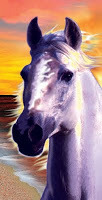 After a week of this, I had a sudden urge to dig out my MoonQuest manuscript, set aside five months earlier just before my summer visit to Nova Scotia. With my life having been turned upside-down by the move, my hundred pages of typed manuscript were buried as deeply from my thoughts as they had been in the file box in which they had been packed before I left Toronto.
After a week of this, I had a sudden urge to dig out my MoonQuest manuscript, set aside five months earlier just before my summer visit to Nova Scotia. With my life having been turned upside-down by the move, my hundred pages of typed manuscript were buried as deeply from my thoughts as they had been in the file box in which they had been packed before I left Toronto.I placed the manuscript on a corner of my kitchen table. It sat next to me through a dinner, breakfast and lunch. It sat there, both seductively and accusingly, daring me to pick it up and read it. A dozen times through those twenty-four hours, I reached for it, then pulled my hand back. I was afraid to touch it, afraid to open it...afraid the manuscript wasn't any good, afraid I had outgrown it and would have to abandon it.
After lunch that second day, I gingerly carried it into the living room. And although I fully expected it to be trash-worthy, I set a pen and notepad next to me. Two hours later, barely aware of what I was doing — much like when I'd begun the story nine months earlier — I picked up pad and pen and began to write, continuing as effortlessly as though I'd stopped for five minutes not five months.
What I realized as I dove back into the story was that I hadn't outgrown The MoonQuest. Rather, it had been so far ahead of me that I'd needed those five months of life experience in order to be able to catch up with it and carry on. Three months and 300 additional pages later, the first draft was done.
4.
One of the dividends of coaching and teaching for me has been that I nearly always attract clients and students who are facing some version of the very issues I'm dealing with. Because of that, I've trained myself to listen for myself to every piece of guidance and advice I offer to others.
As I shared my post-Nova Nada story on the air this afternoon with Carla and her audience, I found myself listening to it as though for the first time and seeing a powerful parallel in it with my life today.
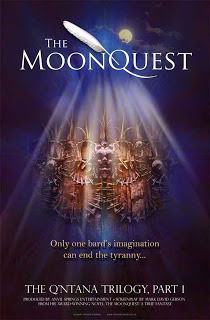 In recent days, I've felt angry and frustrated because in the year since I sold everything off (again!) to move from Albuquerque to L.A., my life has seemed motionless, if not retrograde.
In recent days, I've felt angry and frustrated because in the year since I sold everything off (again!) to move from Albuquerque to L.A., my life has seemed motionless, if not retrograde. I'm back in Albuquerque. I've had to stay with friends through all that time. I've had no car of my own since December. And The MoonQuest movie project, which (without me knowing it at the time) brought me back to Albuquerque after only ten weeks in Southern California, isn't rocketing forward with the speed and momentum I'd hoped for.
It's important to note here that I've been taken care of with amazing elegance through this past year. I've never lacked a place to live or food to eat. I've nearly always had access to a car. I've had just enough work to cover my minimal expenses and keep me free to write and work on the film project. And there is a film project! For all this, I'm extraordinarily grateful.
Still, my words to the universe have been harsh, demanding and, on occasion, whiny over the past forty-eight hours. "Show me change!" I've shouted with mounting impatience. "Positive, measurable, quantifiable change!"
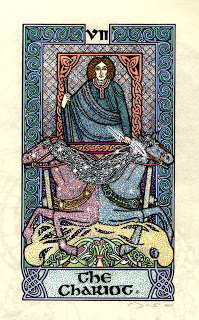 Yesterday evening, with characteristic humor, whatever higher/wiser part of me that's running the show threw me some crumbs. First, it had my dream car pull up next to me as I was out for a walk (a sports model I've never before seen in Albuquerque). Then, it had me pull The Chariot card from the tarot app on my iPhone (The Chariot, from a Celtic tarot deck, is the card that inspired The MoonQuest); I'd never drawn that card on the app before.
Yesterday evening, with characteristic humor, whatever higher/wiser part of me that's running the show threw me some crumbs. First, it had my dream car pull up next to me as I was out for a walk (a sports model I've never before seen in Albuquerque). Then, it had me pull The Chariot card from the tarot app on my iPhone (The Chariot, from a Celtic tarot deck, is the card that inspired The MoonQuest); I'd never drawn that card on the app before.I noticed the signs. But I wasn't assuaged.
Then, eighteen hours later on live radio, in the midst of hearing myself tell that Nova Scotia story about picking up The MoonQuest after a five-month absence, I got it: What I've been experiencing through the past year is no different than what I experienced in those five months in 1994. All this -- all of it -- is the life experience I need in order to grow into whatever destiny next awaits me.
As Eulisha tells Toshar in The MoonQuest, in one of his moments of doubt and fear, "You have glimpsed what may lie ahead. But you are only now building the foundation of that future. If you continue to build, stone by heavy stone...., if you continue to follow the path that is yours alone to follow, you will be that sage, the greatest sage in the time of Q'ntana's greatest king, under the gaze of a grateful moon."
Just as in writing, where no word or draft is ever wasted, so no life experience is ever for nought. Each is one of those stones Eulisha speaks of, part of the foundation of a future I can only begin to imagine.
Am I still impatient? Yes. Am I at peace with the process? If not 100 percent, then more so than I've been in many months. And while I long to see that exchange between Toshar and Eulisha on the giant screen of a movie theatre, rather than only in the etheric screen of my mind, my own words have inspired me to remember the truth, which is that, despite all outward appearances, the story always knows best.
Photos: Albuquerque sky by Mark David Gerson; Nova Scotia flag by "gak"; Nova Nada (now Birchdale Lake Retreat) by Vickie LeBlanc.
Adapted from Acts of Surrender: A Journey Beyond Faith, my memoir-in-progress. (c) 2011 Mark David Gerson.
Please share as you feel called to. But please, also, include a link back to this post.
Recent Acts of Surrender excerpts:
• October 29
• November 15
• March 7
• May 22
• June 12
• July 9
 Please "like" my Facebook pages:
Please "like" my Facebook pages:• The MoonQuest movie
• The MoonQuest book
• The Voice of the Muse book
• Mark David Gerson
Published on July 19, 2011 22:11
No comments have been added yet.

